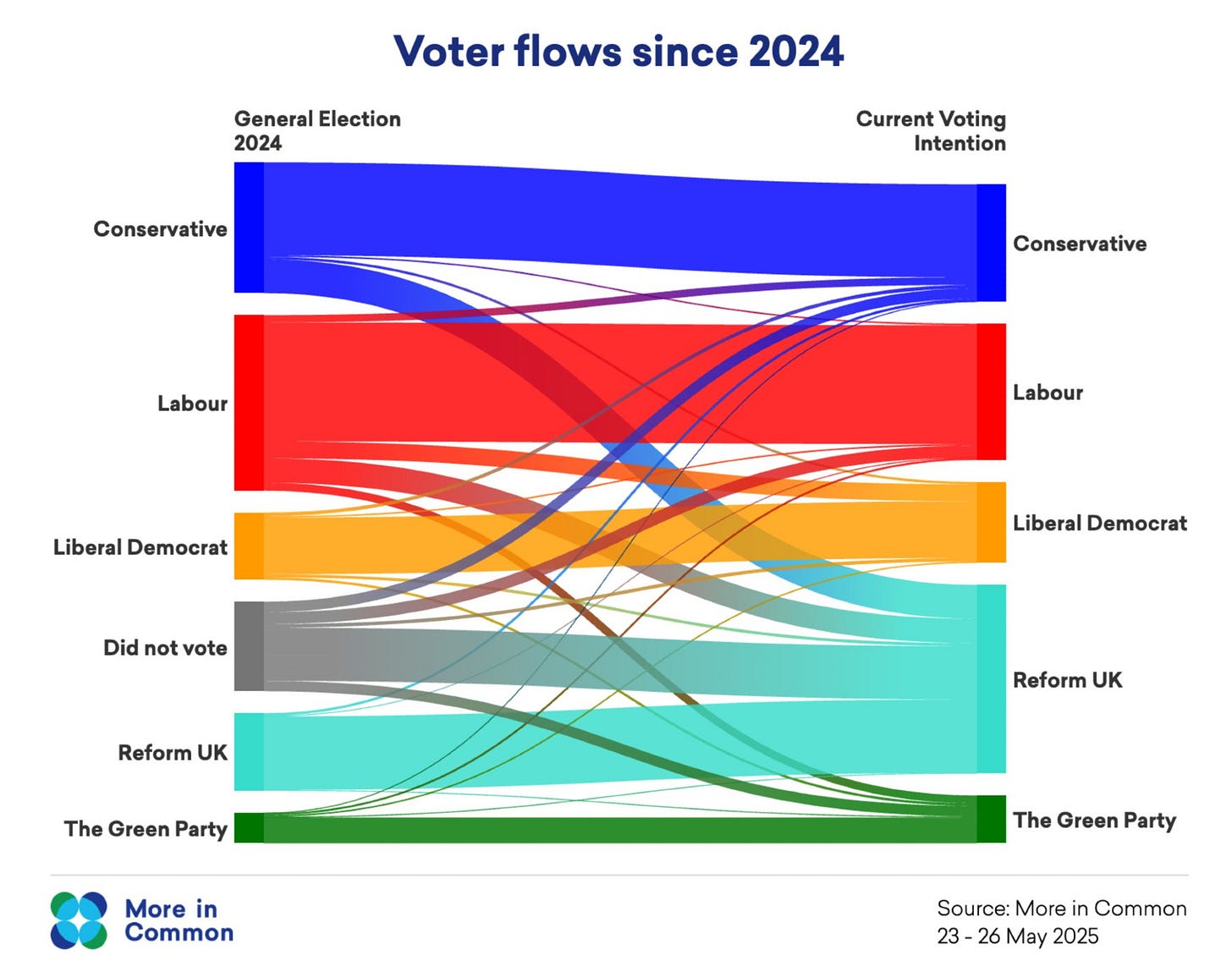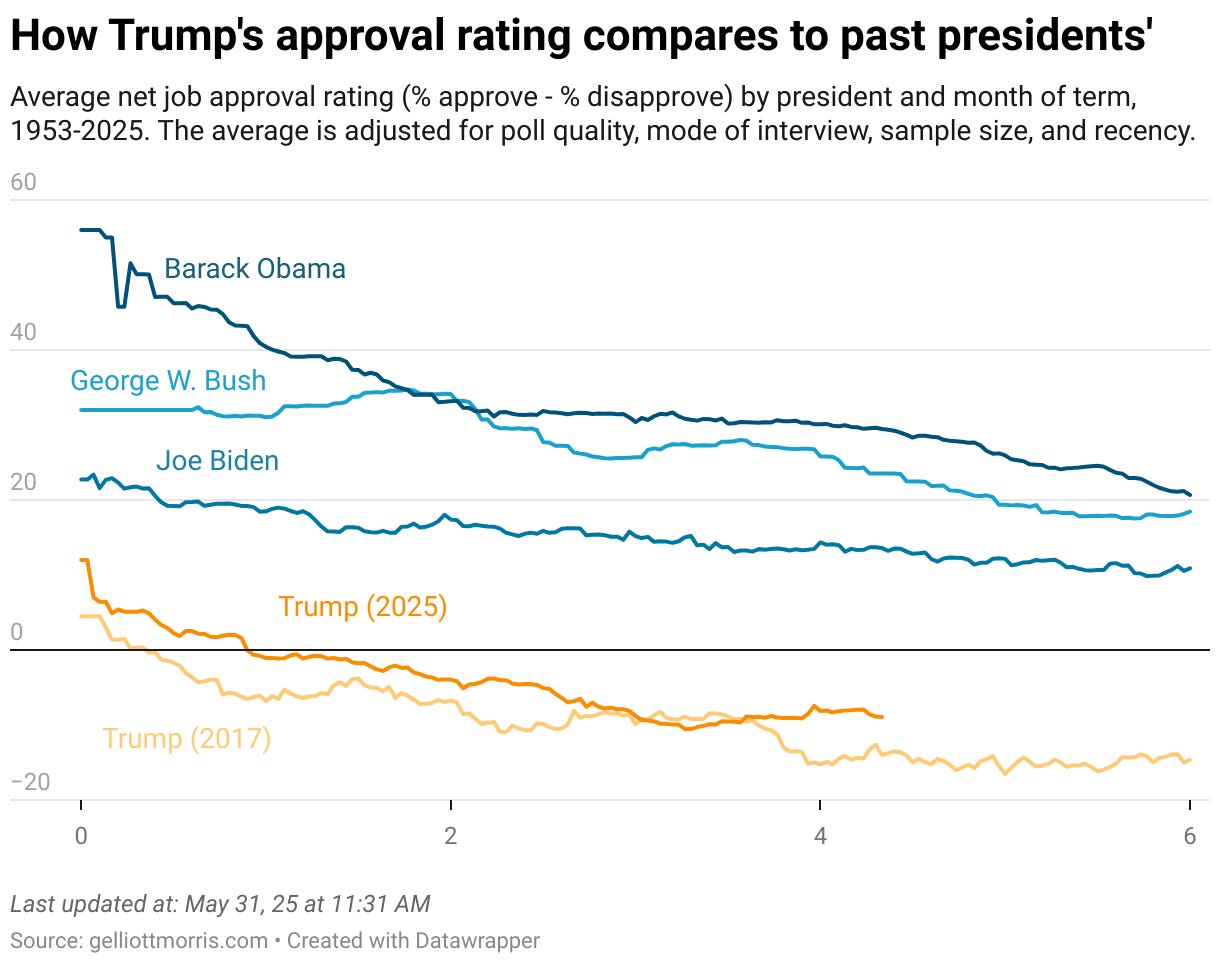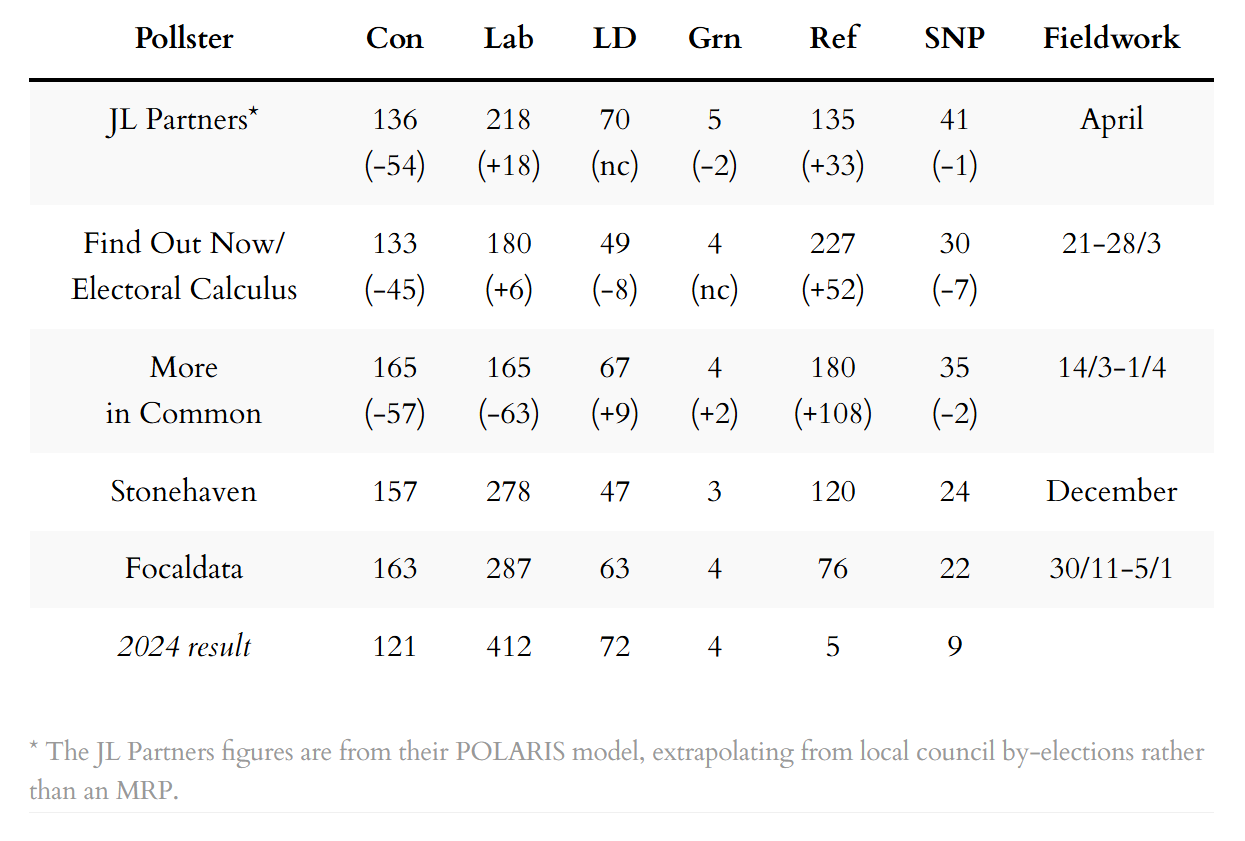Welcome to the 163rd edition of The Week in Polls (TWIP) which takes a look at both strengths and weaknesses in the opinion polls for Reform UK.
Then it is a summary of the latest national voting intention polls and a round-up of party leader ratings.
Those are followed by, for paid-for subscribers, 10 insights from the last week’s polling and analysis.
This time, those ten include how people think support for building houses in their area is lower than it really is.
The Week in Polls often draws heavily on the work of those at UK universities, so a little thank you for me in return with a special offer for anyone with an .ac.uk email address: you can sign up for the paid-for version of this newsletter at half price:
Before we get to the main stuff, a Gallup poll from 1951 where ‘lose’ having only a small lead over ‘put on’ caught my eye:
And with that, on with the show.
Want to know more about political polling? Get my book Polling UnPacked: the history, uses and abuses of political opinion polling.
The good news and the bad news for Reform in the polls
Let us start with the straightforwardly good news for Reform in the polls. Since the local elections, there have been 20 voting intention polls1 from seven different pollsters. They all put Reform in the 27%-33% range, and all have put Reform in first place.
There are caveats to add about how polling well early or mid-term in a Parliament need not lead to general election success, as I highlighted in my piece about 1985 when a new challenger political force won by-elections, progressed in local elections, topped the polls… but then at the next election the two-party system in fact was strengthened.
That said, being first in the polls is still being first and polling is not like cycling where there is benefit from hiding behind someone else ahead of you. First is first. Even as party as dedicated to showing that winning seats under first past the post isn’t about national vote share as the Liberal Democrats would happily take being first in the polls. (Except for the return of the nightmares of 2019, obviously.)
A more serious caveat is about how much Reform’s rise depends on winning over people who did not vote in the 2024 general election, as both data from More in Common and Electoral Calculus shows:

Another illustration of Reform’s reliance on previous non-voters is this comment form Ed Hodgson of More in Common:
2024 nonvoters are having a big impact on voting intention polls at the moment - if we remove all of them from our headline voting intention, Reform's vote share falls from 31% to 26%, significantly shrinking their lead over Labour.
This reliance is a potential weakness for Reform as the general pattern in electoral politics is that hopes for winning by mobilising non-voters do not perform as well as hopes for winning by persuading people to switch from other parties.2
That isn’t an iron law, though, and Reform supporters can point both to the success of the Leave side in the Brexit referendum in mobilising people who do not usually vote and at Reform’s successes in the May 2025 local elections being accompanied by rising turnout. International examples, most notably Donald Trump, are also available.
(A side-note: Reform’s success with previous non-voters does not appear to be about the popular vibe of their supposedly popularity with young men. Data consistently shows that there is no bump in support for Reform among younger people; if anything their support rises with older people.)
Being able to mobilise non-voters could be a strength - it is a large pool of people to tap, particularly outside of Westminster general elections - or it could be a weakness that sees support fail to materialise at future ballot boxes.
A more straightforwardly clear weakness for Reform, though, are questions about how people would prefer to see as Prime Minister.
The short version is that Nigel Farage loses out to everyone else. The longer version is in this YouGov graphic:
Starmer beats Farage, Badenoch and Davey. Davey beats Farage and Badenoch. Badenoch beats Farage, and Farage beats nobody.
That matters in particular because there is very strong folk wisdom among pollsters and political scientists that leading on the ‘best PM’ is crucial for electoral success.
(I say ‘folk wisdom’ because when I look at the detailed work on the impact of leader ratings on electoral results, the picture gets quite messy very quickly such as over exactly what is being taken to be the key indicator - is it best PM, is it best PM relative to your main rival, is it leader approval, is it net leader approval, etc. - and over why it is meant to be important - is it a leading indicator, is it an indicator more resistance to polling errors than voting intention, etc.3 That said, there is a compelling basic headline pattern, such as over how Ed Miliband’s ratings lagged ahead of the surprise Conservative win in 2015.)
Rob Ford explains the situation nicely:
The importance of Farage doing poorly on these numbers is also neatly illustrated by Reform’s chair, Zia Yusuf, calling the above data, “one of the most moronic polls ever done”. That does rather make it sound like the poll has hit a nerve.
A more general reason for caution over Reform’s numbers is the outcome of the trio of examples I wrote about in Unpopular populism: the new international trend?
The populist leader in Canada saw his lead in the polls melt away and he lost. The populist leader in Australia saw his lead in the polls melt away and he lost.
And in the US, the most populist of populist leaders has seen his approval ratings sink. They are not quite the worst on record for a President at this point in their term of office, but that is only because they are slightly beaten by Trump’s first term:
UK readers of that graph make think that a net rating well short of -20 does not sound that bad compared to what we’ve seen in the UK. But in the US, with the polling methodologies and political system of that country, Trump’s ratings are indeed very poor in their polling currency.
A final domestic note of caution comes from how the public places Reform as being a long way to the right of its own views, and further away from the public’s views than the Lib Dems, Labour, the Conservatives or the Greens:
Reform voters place their own views close to Reform, and Conservative voters place Reform closer to their own views than the Labour, Lib Dem or Green parties. But still, Reform is seeing overall as being a long way from where most voters are.
None of these findings are destiny, and all poll figures can move. In fact, they almost certainly will, the only questions being by how much and in which direction.
They do though point to politics being very open - and that is without even having to get into the wild lottery that first past the post becomes when the most popular party is on under 35%.
Ben Ansell has also written a similar piece, focusing on reasons why Nigel Farage may not become PM and in particular looking at tactical voting.
Voting intentions and leadership ratings
Here are the latest national general election voting intention polls, sorted by fieldwork dates.
It is worth noting how much less of an outlier Find Out Now looks these days:
Next, the latest seat projections from MRP models and similar, also sorted by fieldwork dates:
Finally, a summary of the latest leadership ratings, sorted by name of pollster:
For more details, and updates during the week as each new poll comes out, see my regularly updated tables here and follow The Week in Polls on Bluesky.
For the historic figures, including Parliamentary by-election polls, see PollBase.
Catch-up: the previous two editions
My privacy policy and related legal information is available here. Links to purchase books online are usually affiliate links which pay a commission for each sale. For content from YouGov the copyright information is: “YouGov Plc, 2018, © All rights reserved”.4
Quotes from people’s social media messages sometimes include small edits for punctuation and other clarity.
Please note that if you are subscribed to other email lists of mine, unsubscribing from this list will not automatically remove you from the other lists. If you wish to be removed from all lists, simply hit reply and let me know.
People overestimate how much their neighbours oppose new housing, and other polling news
The following 10 findings from the most recent polls and analysis are for paying subscribers only, but you can sign up for a free trial to read them straight away.
New polling from Ipsos asks people both whether they support new housing
Keep reading with a 7-day free trial
Subscribe to The Week in Polls to keep reading this post and get 7 days of free access to the full post archives.











